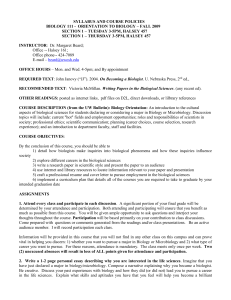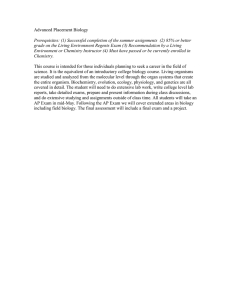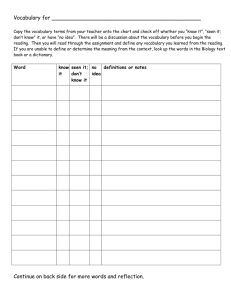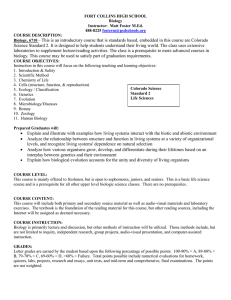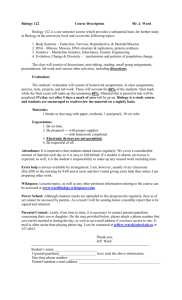SYLLABUS AND COURSE POLICIES
advertisement
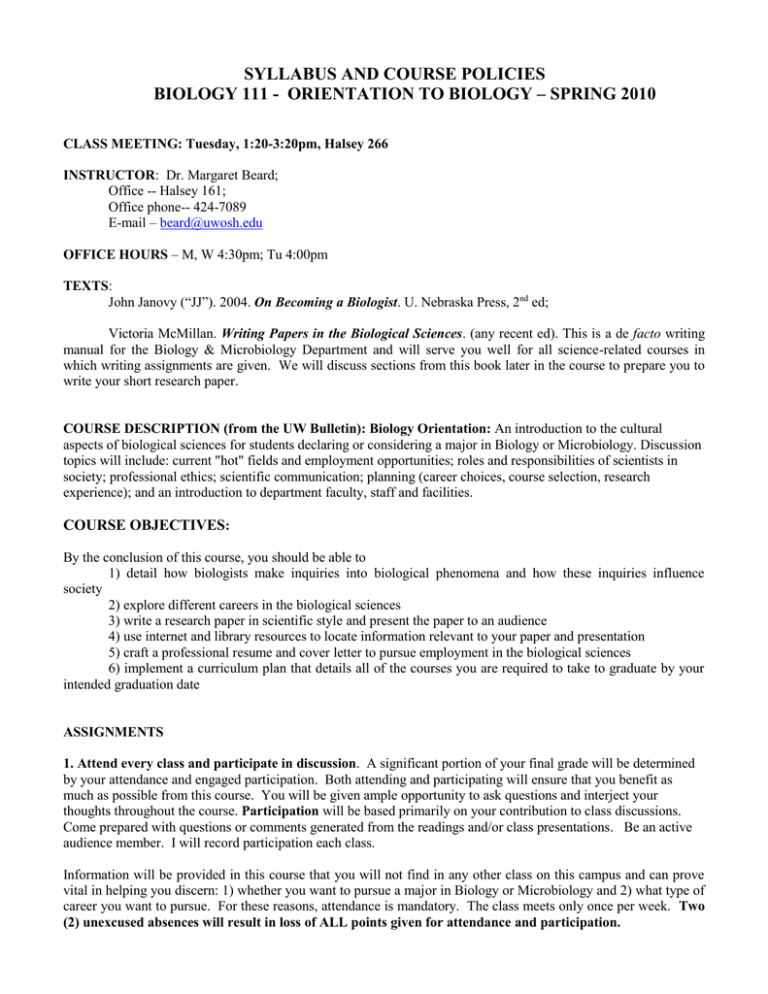
SYLLABUS AND COURSE POLICIES BIOLOGY 111 - ORIENTATION TO BIOLOGY – SPRING 2010 CLASS MEETING: Tuesday, 1:20-3:20pm, Halsey 266 INSTRUCTOR: Dr. Margaret Beard; Office -- Halsey 161; Office phone-- 424-7089 E-mail – beard@uwosh.edu OFFICE HOURS – M, W 4:30pm; Tu 4:00pm TEXTS: John Janovy (“JJ”). 2004. On Becoming a Biologist. U. Nebraska Press, 2nd ed; Victoria McMillan. Writing Papers in the Biological Sciences. (any recent ed). This is a de facto writing manual for the Biology & Microbiology Department and will serve you well for all science-related courses in which writing assignments are given. We will discuss sections from this book later in the course to prepare you to write your short research paper. COURSE DESCRIPTION (from the UW Bulletin): Biology Orientation: An introduction to the cultural aspects of biological sciences for students declaring or considering a major in Biology or Microbiology. Discussion topics will include: current "hot" fields and employment opportunities; roles and responsibilities of scientists in society; professional ethics; scientific communication; planning (career choices, course selection, research experience); and an introduction to department faculty, staff and facilities. COURSE OBJECTIVES: By the conclusion of this course, you should be able to 1) detail how biologists make inquiries into biological phenomena and how these inquiries influence society 2) explore different careers in the biological sciences 3) write a research paper in scientific style and present the paper to an audience 4) use internet and library resources to locate information relevant to your paper and presentation 5) craft a professional resume and cover letter to pursue employment in the biological sciences 6) implement a curriculum plan that details all of the courses you are required to take to graduate by your intended graduation date ASSIGNMENTS 1. Attend every class and participate in discussion. A significant portion of your final grade will be determined by your attendance and engaged participation. Both attending and participating will ensure that you benefit as much as possible from this course. You will be given ample opportunity to ask questions and interject your thoughts throughout the course. Participation will be based primarily on your contribution to class discussions. Come prepared with questions or comments generated from the readings and/or class presentations. Be an active audience member. I will record participation each class. Information will be provided in this course that you will not find in any other class on this campus and can prove vital in helping you discern: 1) whether you want to pursue a major in Biology or Microbiology and 2) what type of career you want to pursue. For these reasons, attendance is mandatory. The class meets only once per week. Two (2) unexcused absences will result in loss of ALL points given for attendance and participation. 2. Write a 1-2 page personal essay describing why you are interested in the life sciences. Imagine that you have just declared a major in biology/microbiology. Compose a narrative explaining why you became a biologist. Be creative. Discuss your past experiences with biology and how they did (or did not) lead you to pursue a career in the life sciences. Explain what skills and aptitudes you have that you feel will help you become a brilliant biologist. Detail career and life goals you intend to reach through your work in the life sciences. How will you change the world through biology? 3. On the first day of class you will be given a set of sheets that describe many career tracks and jobs that a person with a degree in biology can follow. Choose three DIFFERENT career tracks and using the web and search engines research the requirements you would need to have met in order to get a job in that career. This is the Career Exploration Diary posted on D2L. Follow the instructions 4.. Now that you have assumed that you are a biologist and have decided on possible career tracks – plan the academic career that will get you to the career track that interests you most.. Devise a curriculum plan. Everyone would like to graduate on-time. One of the first and most important steps in achieving this goal is to devise a realistic curriculum plan. This is a list of all of the courses you need to take in order to graduate by the date you desire. Submit a list of every course you must take and in what year and semester you intend to take these courses. Few courses are offered every semester; in fact, some are offered very rarely. Be sure every course will be offered in the semester you hope to take it before placing it on your list. Check with the undergraduate Bulletin and/or your academic adviser to be sure classes in question are offered when you would like to take. This is the Five-Year Plan posted on D2L. Follow the directions. Ask Advice from the Advising Office if you do not understand your Star Report and University Requirement. 5. Prepare a resume and cover letter that you would submit to an employer advertising a job in the career track you selected in #4 above. With your resume and cover letter include a copy of the job advertisement that you found in a journal, newspaper, magazine, internet. Be sure to tailor your resume(s) to the required qualifications in the advertisement. Address in the cover letter(s) the strengths that make you an ideal candidate for the job. 6. Write a 3-5 page research paper, with references, on a topic of current interest (to you that is) – such as thinning of the ozone layer; dying off of frogs; health care reform; global warming; alternative energy; alternative medicine; stem cell research; You may well find your topic while doing your journal (see below). Further instructions about this assignment and about scientific writing will be posted on D2L and discussed later in class. 6A. Present your research paper as a 10-15 minute (includes 2+ minutes for question and discussion) power point short summary of your topic and paper. The purposes of this assignment are: 1) to expose the entire class to relevant information about a variety of career possibilities, and 2) to hone your public speaking/oral communication skills. You will already have conducted the necessary research for this presentation as you wrote your paper. The instructor and each student will evaluate the presentations based on Content, organization, logic ,clarity Quality of Visual Aids (easy to read, no misspellings) Delivery (show enthusiasm; DO NOT READ content) A rubric for the evaluations will be handed out. 7. Keep a weekly journal of one article or report of current biological interest that you find in the popular press (Scientific American, Time, Newsweek, NYTimes Science Times, etc. This journal will include a copy of the articles/reports, including the full source (not just a URL), and your summary of each report and critique of why you think the each report is significant. You MAY NOT use a short report on the web as your article or source – but a full and detailed report. Often these short web reports are already distillations of the article or original report. You need to find the source TENTATIVE CLASS SCHEDULE: Week Topic Feb 1st Why You are Here: An Introduction to the course Feb 8th Why are We Biologists; What We Do in the Bio Dept.. Reading Janovy i-xiv Janovy 1-33 Feb 15 Asking Questions in Life Science: Inquiry Feb 22nd What Exactly is Science; Visitor: Mott: from Career Services( finding jobs and resume writing) March 1st How is Science Done The Tools of the Trades Hypothesis Testing March 8th How is Science Done :Making a Living . Janovy - Chapter 4 – pp93-117 Biologists in the World Janovy – Chapter 5 – pp118-end March 15th March 22nd-26 April 5th April 12th April 19th April 16 Assignment due Personal Essay Due Janovy – Chapter Two pp34-68 Career Exploration Diary Resume & Cover Letter SPRING BREAK Writing in the Sciences – Accessing and Citing the Literature - McMillan – Chapters 1 and 6 Writing the Research Paper McMillan – Chapters 4, 7 and 8 Using Tables and Figures; Statistics yes or no McMillan – Chapters 2 and 3: Presentations May 3rd Presentations May 10th Presentations Five-Year Plan Research Paper COURSE EVALUATION Assignment Participation Career Exploration Diary 5-year Plan Personal Essay Resume/Cover Letter Research Paper& Presentation Journals Value (% of overall grade) 10% 15% 10% 10% 10% 25% 20% COURSE GRADING SCALE: 93-100% = A; 90-92%=A-; 87-89% = B+, 83-86% = B, 80-82%=B-; 7779%=C+; 73-76% = C; , 70-72% = C-; 67-69=D+; 63=66%=D; 60-62%=D-; less that 60% = F. I reserve the right to lower the scale if class performance warrants such a change. GENERAL POLICIES AND COURSE GUIDELINES CHEATING: Cheating in any form (i.e. using others work as your own) or other academic misconduct described in the UWO Student Discipline Code could result an F grade for the course and other disciplinary action. Plagiarism: Be especially careful in oral and writing assignments in any class to cite ALL of your sources. ANY INSTANCE OF PLAGIARISM WILL RESULT IN YOUR RECEIVING A COURSE GRADE OF AN “ F”. APPROPRIATE ACADEMIC DISCIPLINARY ACTIONS WILL ALSO BE TAKEN THAT MAY RESULT IN YOUR SUSPENSION OR EXPULSION FROM THE UNIVERSITY. Denote quotations appropriately and use them SPARINGLY. We will discuss briefly how to cite sources in this course, but you are encouraged to investigate appropriate methods of doing so on your own. In addition, staff at the UW Oshkosh Writing Center will be happy to provide further information and evaluate whether you have cited your sources appropriately and accurately. Academic Integrity: Academic dishonesty in any form will not be tolerated. Any instance of such will be dealt with according to relevant University policies. Please note that plagiarism constitutes academic dishonesty and will be treated accordingly as described above. If you are unsure what constitutes plagiarism, contact the instructor. Late Assignments: Late assignments will be accepted only under extremely extenuating circumstances. In such cases, late assignments will be given 1/2 credit. Grade of Incomplete - Incomplete grades will be given only in special circumstances as outlined in University policy as stated in the University of Wisconsin Oshkosh Undergraduate Bulletin. Special Needs and Accommodations: Students needing special accommodations or special services are welcome in this course. Please see me in office hours so that we can make the appropriate arrangements. Provide me with a copy of your Accommodation Recommendation (AR) form. Absences From Class: The university recognizes a short list of reasons that necessitate a student missing a class. These include a university sponsored event, extreme illness, death of an immediate family member. To be excused from a scheduled class for a university activity, you MUST provide me with a letter from the responsible advisor/coach at least one week prior to the event. In the case of illness or family emergency, you must supply a note from the Dean of Students. Absence for any reason does not automatically extend the due date for assignments. Such will be arranged on a case-by-case basis. MAKEUP AND LATE WORK POLICIES: Written assignments will be accepted late for up to half credit. If the original assignment is handed in on time, then I will accept revisions of written assignments for up to 90% of full credit. No work will be accepted after the last meeting day of the class without my permission. The university recognizes a short list of excused absences (e.g. scheduled academic or athletic contests; bereavement). Determining whether an absence is excused is the purview of the Dean of Students, not me. To be excused from a scheduled class for university activities, you MUST provide me with a letter from the responsible advisor/coach at least one week before the event. Requests for deadline extensions based on an excused absence will be considered on a case-by-case basis.
